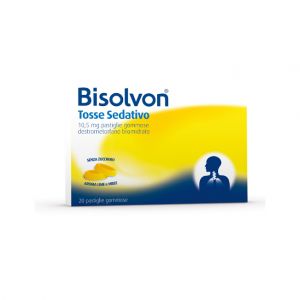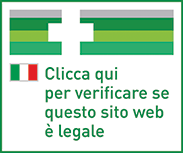Ship in Europe, Find out rates!
Bisolvon Cough Sedative Gummy Lozenges 10.5mg 20 Lozenges

- box Delivery in Italy in 24/48 and free returns
- star3.000+ positive reviews
- dropboxOver 60,000 products in the catalog
Gummy tablets based on dextromethorphan hydrobromide.
Therapeutic indications
Bisolvon Cough Sedative Gummy Tablets is used as a cough suppressant.
Dosage and Posology
The drug should be taken according to the following doses and methods:
- Adults and children over 12 years: 1-2 gummy tablets (10.5 - 21 mg dextromethorphan hydrobromide) to be dissolved in the mouth 4 times a day. Do not exceed the maximum dose of 8 gummy tablets per day (corresponding to 84 mg of dextromethorphan hydrobromide).
- Children under 12 years of age: Bisolvon sedative cough should not be used.
If the cough persists for more than 5-7 days, consult your doctor. Prolonged treatment beyond 5-7 days is not recommended.
Overdose
In the event of an overdose, known undesirable effects may occur with greater frequency or severity: nausea, vomiting, gastrointestinal disturbances, dizziness, fatigue as well as drowsiness and hallucinations. Likewise, as doses increase resulting in an overdose, restlessness and excitability can evolve into agitation. Symptoms such as reduced concentration and consciousness up to coma may also occur, as a sign of severe intoxication, mood changes such as dysphoria and euphoria, psychotic disorders such as disorientation and delirium up to states of confusion or paranoia, increased muscle tone , ataxia, dysarthria, nystagmus and visual disturbances and central nervous system disorders as well as respiratory depression, changes in blood pressure, hypotension and tachycardia. Dextromethorphan may lead to an increased risk of serotonin syndrome, which is increased in the event of an overdose, especially if other serotonergic agents are taken concomitantly. In extreme cases, urinary retention and respiratory depression can occur
If necessary, seek intensive medical care (in particular intubation, ventilation). It may be necessary to take precautions to safeguard heat loss and replenish fluids. Intravenous administration of naloxone may antagonize the effects of dextromethorphan on the central nervous system. If necessary, perform gastric lavage with stable circulation. Do not administer centrally acting emetics.
Contraindications
- Hypersensitivity to the active substance or to any of the excipients
- Do not use at the same time or in the two weeks following MAO inhibiting antidepressant drugs
- Bronchial asthma, COPD (chronic obstructive pulmonary disease), pneumonia, breathing difficulties, respiratory depression, cardiovascular disease, hypertension, hyperthyroidism, glaucoma, prostatic hypertrophy, stenosis of the gastrointestinal and urogenital tract, epilepsy, severe liver disease.
- Do not give to children under 12 years of age.
- Sedative bisolvon cough should not be given to patients with fructose intolerance.
- Pregnancy, especially in the first trimester, breastfeeding
- In case of rare hereditary conditions of incompatibility with one of the excipients, the use of the medicinal product is contraindicated.
Side effects
Adverse reactions are listed below by system organ class and frequency according to the following categories: Very common ≥ 1/10 Common ≥ 1/100 to <1/10 Uncommon ≥ 1 / 1,000 to <1/100 Rare ≥ 1 / 10,000 to <1 / 1,000 Very rare <1 / 10,000 Not known frequency cannot be estimated from the available data.
- Immune system disorders:
- Not known: hypersensitivity reactions including anaphylactic reaction, angioedema, urticaria, pruritus, rash and erythema.
- Psychiatric disorders:
- Very rare: hallucinations, cases of abuse and dependence on dextromethorphan.
- Nervous system disorders:
- Common: dizziness.
- Very rare: somnolence.
- Gastro-intestinal disorders:
- Common: nausea, vomiting, gastrointestinal upset and decreased appetite.
- Skin and subcutaneous tissue disorders:
- Not known: fixed drug eruption.
- General disorders and administration site conditions:
- Common: fatigue.
If undesirable effects other than those described above occur, the patient must immediately notify their doctor.
Pregnancy and breastfeeding
The results of epidemiological studies on a limited sample of the population did not indicate an increase in the frequency of malformations in children who were exposed to dextromethorphan during the prenatal period. However, these studies do not adequately document the period and duration of treatment with dextromethorphan. Non-clinical reproductive toxicity studies do not indicate a potential risk to humans for dextromethorphan. Bisolvon sedative cough should not be used during the first three months of pregnancy; moreover, since the administration of high doses of dextromethorphan, even for short periods, can cause respiratory depression in newborns, in the following months the drug should be administered only in case of real need and after a careful evaluation of the benefits and risks.
Since excretion of the drug in breast milk is not known and a respiratory depressive effect on the newborn cannot be excluded, sedative bisolvon cough is contraindicated during breastfeeding.
Special warnings
Dextromethorphan can be mildly addictive. Following prolonged use (e.g. exceeding the recommended treatment period), patients may develop tolerance to the drug, as well as mental and physical dependence. Patients with a tendency to abuse or dependence should take bisolvon cough sedative for short periods and under close medical supervision. Cases of dextromethorphan abuse have been reported, predominantly in adolescents. Sedative bisolvon cough should be used with caution in patients taking serotonergic drugs (other than MAO inhibitor drugs), such as selective serotonin reuptake inhibitors (SSRIs) (e.g. fluoxetine, paroxetine) or tricyclic antidepressant drugs (see section 4.5) . There is limited information on the use of dextromethorphan in patients with impaired hepatic or renal function. Therefore, sedative bisolvon cough should be administered with caution in such patients, especially in patients with severe impairment.
Due to the potential for histamine release, the use of sedative bisolvon cough should be avoided in case of mastocytosis. A chronic cough can be an early symptom of asthma and therefore Bisolvon sedative cough is not indicated for chronic cough suppression, particularly in children. Bisolvon sedative cough should not be used in children under 12 years of age. In the case of a productive cough, with a significant production of mucus (e.g. in patients with diseases such as bronchiectasis and cystic fibrosis) or in patients with neurological diseases associated with a marked reduction in the cough reflex (such as stroke, Parkinson's disease and dementia), treatment of bisolvon cough sedative as a cough suppressant should be administered with particular caution and only on medical advice after careful benefit-risk assessment.
Prolonged treatment beyond 5-7 days is not recommended.
The maximum recommended daily dose of sedative bisolvon cough contains 6.8 g of liquid maltitol. Due to the presence of maltitol, patients with rare hereditary problems of fructose intolerance should not take this medicine. The caloric value of maltitol is 2.3 kcal / g. In the case of diabetes and low-calorie diets, subjects should take this into account in the calculation of the diet. It can have a mild laxative effect. Alcohol intake is not recommended during therapy
Expiration and retention
Check the expiration date indicated on the package. The expiry date indicated on the package refers to the product in intact packaging, correctly stored. This medicine does not require any special storage conditions.
Warning : do not use the medicine after the expiry date indicated on the package.
Composition
One Bisolvon Cough Sedative tablet contains:
Active principle
Dextromethorphan hydrobromide 10.5 mg
Excipients
Acacia, betadex, anhydrous citric acid, honey flavor, lime flavor, levomenthol, liquid paraffin, white beeswax, quinoline yellow, sodium saccharin, liquid maltitol, sodium cyclamate, purified water.


